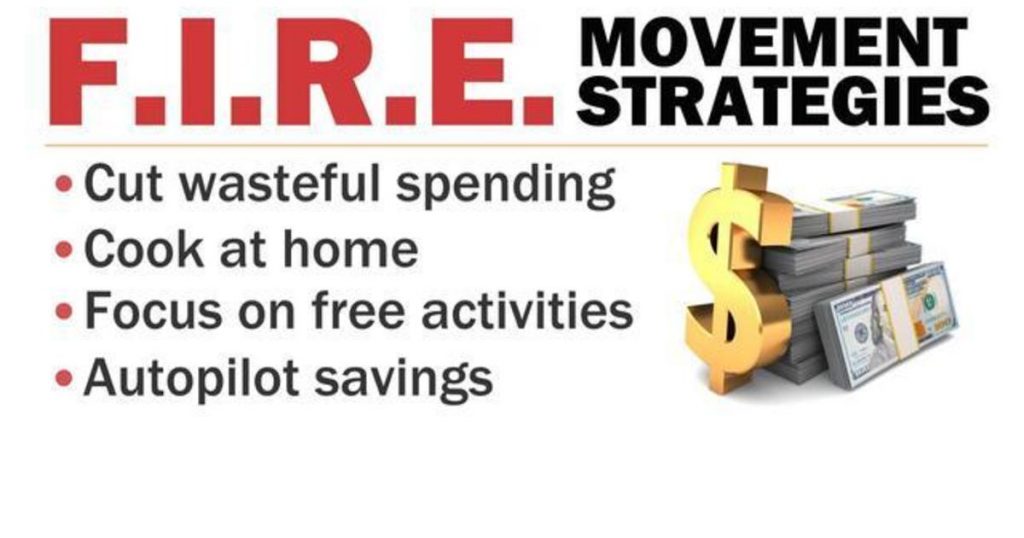
There’s a fast-growing trend among frugal young Americans: saving aggressively to retire early.
The “Financial Independence, Retire Early,” or F.I.R.E., movement encourages people to live a thrifty life and save a high portion of their income in order to take control of their financial independence in the future.
Kiersten Saunders, 34, and her husband Julien, 39, have embraced the movement.
“I would say the genesis for me is really an act of social and cultural rebellion,” Julien said. “We are in an environment where consumer culture is really extreme, where work culture is really extreme, and I would have these conversations with friends and family members who didn’t enjoy their jobs but kept doing it because they had to. And they still didn’t have any savings, and the cycle just repeated [itself] to where they were essentially living their lives in debt.”
The couple is working towards hitting their F.I.R.E. number, $1.3 million, which is 25 times their annual expenses. They expect to reach their goal in 2021
“The intuition behind it is fairly simple,” Kiersten said. “It’s save your money, so that you don’t have to work forever.”
For Kiersten, the first step was cutting down on spending. “I was a huge spender,” she said. “I had a significant amount of consumer debt, and I was just spending way more than I earned — and so for me, the first step for F.I.R.E. was to eliminate the debt. To pay off all the credit cards … and to lower my living expenses.”
But for Julien, who says he’s not a “natural spender,” it was “just a matter of wanting to live the sort of life that I really felt that I had the opportunity to.”
“I just figured out that there was a smarter way to be doing this,” he said. “I didn’t have to be a financial expert, I didn’t have to be a huge tech entrepreneur, I just had to be really savvy about how I invest my money and how I spend it.”
Kiersten emphasized that while the pair is giving up some things that many enjoy, they don’t see it as making “sacrifices.”
“We consider them to be tradeoffs,” she said. “We’re trading off one decision now to be able to have plentifully in the future. So we might not eat out as much today, [but that] doesn’t mean that when our portfolio grows and when we’re no longer working and no longer have the burden of the day-to-day grind, that we won’t eat out then.”
“I think the biggest misconception of the F.I.R.E. movement would be how extreme it is,” Julien added. “There are stories out there of the people who are doing rather unusual things, but I wouldn’t consider it extreme. I think what is extreme is the consumer culture that we are a part of right now. We are trained to spend almost every single dollar that we have. Our average national savings rate is incredibly low, and so we look at that and think that’s actually pretty extreme, that people aren’t preparing for their futures.”
“I think the other misconception about F.I.R.E. is that you have to retire, and that retiring means that you’re not doing anything,” Kiersten said. “Unfortunately, the language around work hasn’t evolved as much as it has in other areas of society. And so retirement for us is meaningful work: Work that we control, work that we can predict and that we have some input into, versus it being cascaded to us from a boss or a boss’s boss.”
The couple offered a few suggestions for those hoping to follow suit. “I think one of the biggest ways you can cut your spending is to focus on the big three expenses,” Julien said. “Housing, transportation, and food for most people are the largest expenses that you have — so if you can live small, or live with someone, or do whatever it takes to keep that cost low or eliminate it altogether, that’s going to be a huge way to boost your savings over time.”
“You don’t have to jump in feet first,” Kiersten said. “You can just decide maybe, ‘we’re not spending any money on Wednesdays,’ or maybe ‘we do a month of not eating out.’ Or maybe ‘we cut cable for a month.’ Just make little tweaks in your budget to see what it feels like to start freeing up capital.”
CBS News business analyst Jill Schlesinger also joined “CBS This Morning” on Tuesday to share her views on the movement and her own tips for increasing financial security.
Schlesinger explained the genesis of the movement as a reaction against the Great Recession. “A lot of the older millennials had suffered so much, and they saw what happened to their parents, and they said ‘uh oh, we gotta get going,’” she said.
Schlesinger said she finds the movement “laudable,” and that while some financial journalists have criticized F.I.R.E. for offering “false hope,” it’s important to celebrate “anything that gets us in the habit of saving, and questioning why we are spending the way we are spending.”
She also addressed the criticism that F.I.R.E. is only for millennials in lofty tech jobs who take home ample paychecks. When she interviewed adherents for her podcast, she said, they emphasized that “every single person makes choices every week about how they spend money.”
“So imagine if you could find $10, $15, $20 that maybe you’re just throwing away, and capture that money, put your savings on autopilot, put a game plan together,” she added.
In order to do that, Schlesinger said, it’s “imperative” to track your expenses, and try to automate saving for retirement and investing.
“Even if you don’t get to retire when you’re 40 or 50, what you do gain is a sense of control,” she said.
